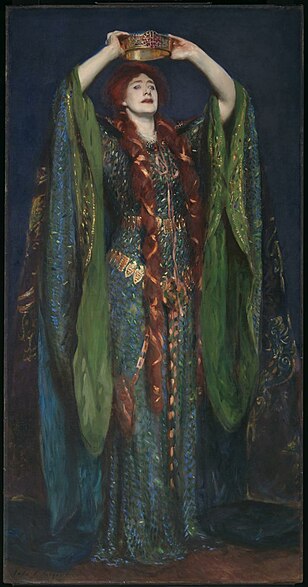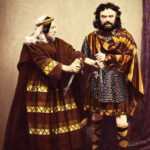So tonight my wife’s at work and I’m putting the kids to bed. My older girls are in their rooms reading, and I’m laying (lying?) down in my 5yr old son’s bed with him.
“Daddy!” yells the 9yr old from her room, “There’s a Shakespeare quote in my book!”
“Which one?” I yell back.
“Life’s but a walking shadow…” she begins.
“…that struts and frets his hour upon the stage. A tale told by an idiot, full of sound and fury, signifying nothing.” I reply. And, yes, I missed a few words in the middle.
“Yes, that one,” comes the reply.
“Macbeth. That’s a good one.”
“Why is that a good one?” asks the 5yr old.
“Well, he’s sad because his wife died,” I say.
Somehow I end up telling the story of Macbeth. To my 5yr old. As a bedtime story. My 5yr old who is prone to bad dreams as it is.
I now present my very shortened, very censored, off-the-top-of-my-head version of Macbeth, suitable for 5yr olds:
Once upon a time there was a soldier in the army named Macbeth. One day when he was coming home from the war he ran into a witch who said, “Greetings, King of Scotland!”
“I’m not king of Scotland, you crazy witch!” said Macbeth.
“Not yet!” said the witch. “But you will be.”
So Macbeth went home and told his wife this crazy story. “You know what we should do?” said his wife. “We should invite the king over, and then when he’s sleeping we should take his crown! Then you could be king!”
“I don’t know about that,” said Macbeth, “I mean, he’s a good king, he’s never really done anything to us.”
“What sort of chicken are you?!” his wife yelled at him. “The witch said you are going to be king. How do you expect that to happen if you don’t take action?”
Macbeth agreed, and they invited the king over to dinner. Sure enough, that might while he slept they came into his room and stole his crown, and then Macbeth proclaimed himself king of Scotland.
Well this was just plain silly, as everybody knew you don’t get to be king just by taking the crown. But Macbeth locked himself up in a castle and wouldn’t listen to anyone who tried to talk sense into him.
Meanwhile, the king’s family went off and rallied support to get their crown back. They brought in Macduff, a brave warrior, to face Macbeth in hand-to-hand combat. Macbeth thought that he would easily win because the witches told him that he would be king. But Macduff won the battle, and rather than keep the crown for himself he gave it back to the original king who was the rightful owner.
“What happened to Macbeth?” my audience of 1 asks.
“He lost the battle,” I say, stalling.
“How did he lose the battle?”
“They had a sword fight, and he lost. Macduff made him surrender.”
“So did Macbeth go to jail?” I love the 5yr old perspective.
“You know,” I tell him, “I’m not sure. The story doesn’t really say what happens next. But I think you’re right, I think that he probably went to jail.”
At this point, and I am totally not kidding, my 5yr old decides that he’s in a Shakespeare mood, and he wants to hear the one about the father who has to divide his kingdom up among his three daughters but he gets mad because one says she doesn’t love him most of all. I’m flabbergasted at this – I may have told him Lear like, once, a year or more ago.
As a matter of fact, I have this story that I told my middle daughter back in 2007, but my son was only 18months old! I know I’ve told him the story, but right now I can’t find a link to it.
…continued in part 2, because this is a very long post. 🙂





